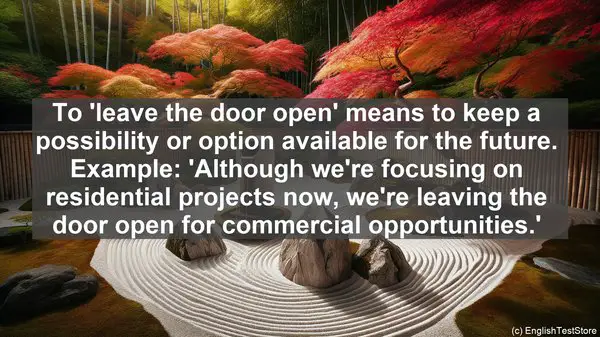1. ‘Open doors’
This idiom is often used to describe an opportunity or a chance for success. For an overhead door installer, it could mean a new project or a potential client. Example: ‘The recent construction boom has opened doors for many door installers.’
2. ‘Close the door on’
When someone ‘closes the door on’ something, it means they are rejecting or ruling out that possibility. Example: ‘The safety concerns closed the door on using that particular type of door opener.’
3. ‘Behind closed doors’
This phrase refers to something that happens privately or secretly, away from public view. Example: ‘The negotiations for the new contract are happening behind closed doors.’
4. ‘Get your foot in the door’
To ‘get your foot in the door’ means to secure an initial opportunity, often with the hope of further progress. Example: ‘Starting as an assistant can be a great way to get your foot in the door of the door installation industry.’
5. ‘On the doorstep’
When something is ‘on the doorstep,’ it means it is very close or imminent. Example: ‘The deadline for the project is on our doorstep, so we need to work efficiently.’
6. ‘Knock on wood’
This phrase is used to express a desire for good luck or to avoid tempting fate. Example: ‘We’ve had a smooth run of installations this month, knock on wood.’
7. ‘The door is always open’
When someone says ‘the door is always open,’ it means they are always available and willing to listen or help. Example: ‘Our supervisor is very approachable, and his door is always open for any concerns.’

8. ‘Shut the door’
This idiom is often used to indicate the end of a discussion or the refusal of further input. Example: ‘After considering all the options, we decided to shut the door on that design.’
9. ‘Leave the door open’
To ‘leave the door open’ means to keep a possibility or option available for the future. Example: ‘Although we’re focusing on residential projects now, we’re leaving the door open for commercial opportunities.’

10. ‘A revolving door’
This phrase is used to describe a situation where there is a constant flow of people or things, often indicating instability or rapid changes. Example: ‘The high turnover rate in that company makes it feel like a revolving door.’
